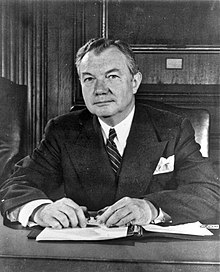Robert H. Jackson
Robert Houghwout Jackson (born February 13, 1892 in Spring Creek Township , Warren County , Pennsylvania , † October 9, 1954 in Washington, DC ) was an American lawyer and politician. He held the office of Attorney General , was a judge at the Supreme Court of the United States and for his country the lead prosecutor in the Nuremberg trials .
Origin and family
Jackson was born the only son of the farmer and lumberjack William Eldred Jackson and his wife Angelina Houghwout. Angelina had Dutch roots. Jackson grew up with his sister in Frewsburg , New York. On April 24, 1916 he married Irene Alice Gerhardt from Kingston, together the couple had two children: William Eldred Jackson II (* July 19, 1919 - December 4, 1999) and Mary Margaret Jackson (* February 11, 1921).
Early activity
After graduating from high school, Jackson joined a law firm in Jamestown , New York as a paralegal . His legal knowledge acquired in this context, he deepened 1911-1912 as part of a short study at the Law School of Albany . In 1912 he finished his studies without obtaining a formal university degree, because at 21 he was not yet the minimum age to obtain a degree. Nevertheless, he passed the bar exam in 1913 and was admitted to the bar. He then worked as a lawyer in Jamestown. Since 1934, Jackson served as General Counsel with the Internal Revenue Service , the highest federal financial agency. From 1936 to 1938 Jackson was Deputy Solicitor General and made a name for himself in various antitrust cases.
After serving as Solicitor General from 1938 to 1939, he was appointed Attorney General by President Roosevelt to succeed Frank Murphy . With the appointment of Harlan Fiske Stone as Chief Justice in 1940 Jackson took the vacated seat as a judge of the United States Supreme Court. In 1941, the Law School caught up with his graduation and awarded him a Bachelor of Laws degree , and finally an honorary Legum Doctor title in 1951 .
In 1943 he was responsible for a controversial verdict (West Virginia State Board of Education v. Barnette) that repealed a regulation that gave a public school the opportunity to oblige its students to salute their flags and to impose penalties on those students for violations . Jackson led the majority vote in favor of the illegality of the regulation.
Chief Prosecutor in Nuremberg
Jackson was given leave of office as Supreme Court Justice in 1945 to help draft the London Charter of the International Military Tribunal, which provided the legal basis for the Nuremberg Trials . Jackson then traveled to Germany , where he became the United States' chief prosecutor. The later inventor of the term “ genocide ”, the Polish genocide researcher and lawyer Raphael Lemkin , assisted him. Jackson filled this role not only with legal and rhetorical skill, but also with great dedication. However, after the trial of the major war criminals , he gave up this position and returned to the United States.
death
Jackson died of a heart attack on October 9, 1954 at the age of 62 in Washington, DC and was buried in Frewsburg, New York .
Others
The work of Robert H. Jackson in the context of the Nuremberg Trials was the subject of the two-part " Nuremberg - In the Name of Humanity " (untitled: "Nuremberg"). Jackson himself was played by Alec Baldwin .
literature
- John J. Patrick, Richard M. Pious, Donald A. Ritchie: The Oxford Guide to the United States Government. Oxford University Press, New York 2001, ISBN 978-0-19-514273-0 , p. 330 (= Jackson, Robert H .: Associate Justice, 1941-54 ).
Web links
- Literature by and about Robert H. Jackson in the catalog of the German National Library
- Robert H. Jackson Center
- Robert H. Jackson in the Miller Center of Public Affairs of the University of Virginia (English)
- Robert H. Jackson in the Munzinger archive ( beginning of article freely accessible)
| personal data | |
|---|---|
| SURNAME | Jackson, Robert H. |
| ALTERNATIVE NAMES | Jackson, Robert Houghwout (full name) |
| BRIEF DESCRIPTION | US Chief Prosecutor at the Nuremberg Trials |
| DATE OF BIRTH | February 13, 1892 |
| PLACE OF BIRTH | Spring Creek Township , Pennsylvania |
| DATE OF DEATH | October 9, 1954 |
| Place of death | Washington, DC |



